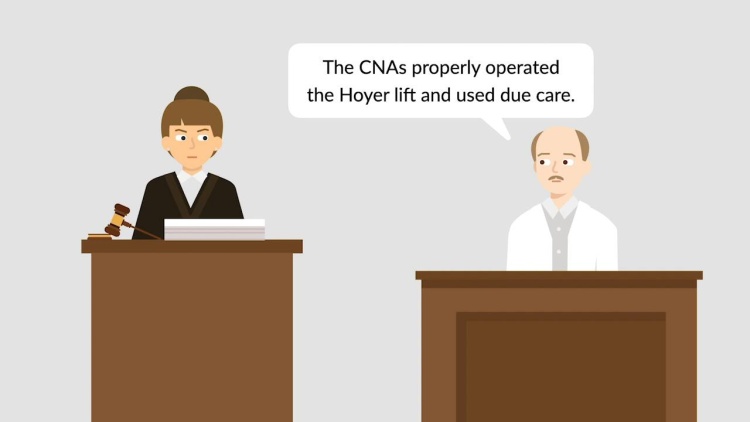Myers v. Heritage Enters., Inc.
Illinois Appellate Court
820 N.E.2d 604 (2004)

- Written by Denise McGimsey, JD
Facts
Mary Prillmayer resided at a nursing home owned and run by Heritage Enterprises, Inc. (Heritage) (defendant). In August 2000, two certified nurse’s aides (CNAs) attempted to transfer Prillmayer from a wheelchair to a bed using a “Hoyer lift” device. While doing so, Prillmayer fell and fractured both legs. Two weeks later, Prillmayer died, apparently of causes unrelated to her fall. The executor of Prillmayer’s estate, Michael Myers (plaintiff), sued Heritage pursuant to a state statute that imposed liability upon nursing-home facilities for injuries to residents caused by “failure …. to provide adequate physical or personal care or maintenance.” At trial, the parties offered conflicting evidence. Heritage’s case was based on an expert witness who testified to the standard of care in using the Hoyer lift. At a jury conference on the final day of trial, Myers proposed that instructions on ordinary negligence be given, i.e., defining the standard of care as what a reasonably careful person would have done under the circumstances. Over Myers’s objection, the court chose to give Heritage’s proposed instructions on professional negligence. Those instructions provided that the CNAs were professionally negligent if they failed to use the knowledge, skill, and care used by reasonably competent CNAs in like circumstances. The instructions further provided that the jury could make its determination only by considering expert testimony and not by relying upon any personal knowledge. The jury found in favor of Heritage. Myers appealed.
Rule of Law
Issue
Holding and Reasoning (Myerscough, J.)
What to do next…
Here's why 907,000 law students have relied on our case briefs:
- Written by law professors and practitioners, not other law students. 47,100 briefs, keyed to 996 casebooks. Top-notch customer support.
- The right amount of information, includes the facts, issues, rule of law, holding and reasoning, and any concurrences and dissents.
- Access in your classes, works on your mobile and tablet. Massive library of related video lessons and high quality multiple-choice questions.
- Easy to use, uniform format for every case brief. Written in plain English, not in legalese. Our briefs summarize and simplify; they don’t just repeat the court’s language.





